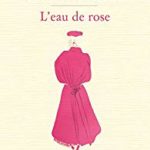L’Eau de Rose by Christophe Carlier. Published in French by Editions Phébus, Paris, January 2019.

L’Eau de Rose literally means rose water, a natural face cleanser. Metaphorically it means sentimental. A roman à rose is a romance novel. This play on words in the title hints at the double meanings to come.
L’Eau de Rose is a complex little book that allows easy entry but rewards long reflection. At first we think we know what it is: a braided narrative that goes back and forth between the story Sigrid, the narrator, is living and the story she is writing. The two sections are in two different genres. Sigrid’s story is told in the style of realistic literary fiction, with emphasis on character development and style; and the story of Priscilla, the romance novel heroine, is plot heavy, fast moving, with a big dose of fantasy.
At least that’s what we think at first. But as we read, we become more and more invested in the roman à rose strand. It begins to seem like the more plausible part of the braid. We wonder: Is Sigrid such a skillful writer that her characters seem real? Or does the writer give so much to her art that she sometimes loses the vitality in her life?
At first the two main characters seem familiar. There’s the romance novelist whose life does not resemble those of her characters at all. And the romance novel character, who seems to be nothing but “adorable” and “irresistible.” But, as in the best novels, nothing turns out to be what it seemed.
We think we know who Sigrid is. She’s one of those middle-aged women (“between two ages” is the author’s more elegant phrase) who are invisible. At first her invisibility is metaphorical. As an author, she speaks through her characters and disappears in them. As a woman long past her twenties, she is used to not being noticed. Everything changes, though, when she checks into a hotel on a Greek island to write. She becomes aware of a young woman whose gaze offers her “a silent invitation.” Who is this mysterious stranger, and why would someone so beautiful be drawn to Sigrid?
The woman’s name is Gertrude, Sigrid discovers during their first dinner. Gertrude dresses in black because she is mourning her late beloved aunt, who left her an inheritance sufficient to travel to places such as this far-flung island.
Halfway through the book, Sigrid disappears for an evening to spy on Gertrude, whom she has become obsessed with. She looks in the mirror and doesn’t see her reflection. The maids in the hall don’t see her, and neither does Gertrude, out on the beach. Thus Sigrid’s invisibility becomes literal. Or does it? The next day, word spreads that the poppy seeds in the breakfast bread can sometimes cause hallucinations.
This metaphor-turned-literal seems to ask, Can middle-aged women use their invisibility as an advantage? Can it give them power? The power to take people by surprise, to become something our culture does not expect them to be able to be?
The questions that drive the two interwoven plots—are Sigrid and Gertrude going to have sex and are Priscilla and her fiancé going to get married and live happily ever after—are answered in delightfully unexpected ways. Subplots involving other guests at the hotel (a magician, an opera singer, a burglar, and the devil, to name just a few) contribute to the book’s odd magical quality, as well as to its suspense.
I have been a fan of Christophe Carlier’s work since I read his first novel, l’Assassin à la Pomme Verte, which won the Best First Novel Award in 2014. Since then, Carlier has been prolific, publishing three more novels and one book of essays/criticism/homage, on the subject of the cartoonist Sempé. (My other reviews of his work can be found here and here and here.)
The link between Sempé’s work and Carlier’s is worth noting. They both share an economy of expression (Sempé can create an idiosyncratic portrait in just a few lines, and Carlier’s short books never waste a word). Their cartoons and novels seem simple at first, but are far from it. They also share the same spirit: of whimsy, curiosity, and innovation.
L’Eau de Rose is, in the end, a cleanser. It will cleanse you of your preconceptions. You’ll question your assumptions about literary genres, the erotic lure of middle-aged women, betrayal, loyalty, and the power of the imagination.



